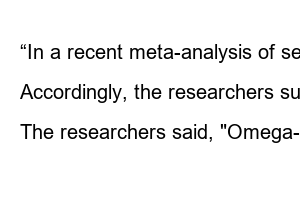오메가 3 부작용Some studies have reported that high doses of omega-3 must be taken to prevent cardiovascular disease, but the side effect of atrial fibrillation (AF) increases in proportion to the dose.
It is said that administering high doses for effectiveness can increase AF side effects, leading to a dilemma of effectiveness and side effects. As previous research showed that omega-3 medication increases the risk of atrial fibrillation, verification work has begun in Korea as well.
The results of a study on the correlation between omega-3 medication and the occurrence of AF, conducted by Professor Heo Ji-hye of the Department of Endocrinology at Hallym University Sacred Heart Hospital, will be published in the Journal of Internal Medicine.
In some clinical trials, the use of omega-3 fatty acids reduced the incidence of cardiovascular disease, but also reported an increased risk of AF.
Considering that studies did not show a consistent effect of omega-3 in preventing cardiovascular disease and that the risk of developing AF was also mixed, the research team began to analyze whether dosage and formulation had an effect by reexamining and analyzing existing studies. .
In conclusion, high-dose medication was associated with an increased risk of AF.
First, in the OMEMI trial, which randomly divided 1,027 elderly patients with myocardial infarction and administered either omega-3 fatty acids (EPA+DHA 1.8g/day) or corn oil, there was no significant difference in composite cardiovascular events between the two groups after 2 years of administration. The incidence of AF was higher in the omega-3 treatment group.
The incidence of AF was 7.2% in the omega-3 treatment group and 4% in the corn oil treatment group, which had no effect on cardiovascular prevention, but only increased side effects.
Through the STRENGTH clinical trial, the researchers analyzed that while Omega-3 was not effective, it only increased AF side effects. The STRENGTH trial divided 13,078 patients at high risk of CVD into omega-3 fatty acid (EPA+DHA 4g/day) or corn oil treatment groups and followed them for an average of 42 months.
The analysis showed no significant differences between the two groups in major composite CV outcomes, while the risk of AF was approximately 70% higher in the omega-3 fatty acid group than in the corn oil group (2.2% and 1.3%, respectively; HR 1.69).
“A recent meta-analysis of six RCTs found that omega-3 fatty acids were associated with a higher risk of developing atrial fibrillation compared to placebo (IRR 1.29),” the researchers said. “If there was a high triglyceride level, the risk of developing atrial fibrillation was higher compared to placebo.”
“Another meta-analysis also found that omega-3 fatty acid supplementation significantly increased the risk of atrial fibrillation (IRR 1.31),” he said. “In a recent meta-analysis of 7 RCTs and 81,210 patients, omega-3 fatty acid supplementation significantly increased the risk of atrial fibrillation (IRR 1.31).” “Patients had a 25% increased risk of atrial fibrillation compared to patients treated with placebo.”
In particular, it is analyzed that the dosage is directly related to the risk of AF. In some studies, a cardiovascular protective effect was observed when dosing more than 4 g per day, but even this was not consistently reproduced in other studies.
“We found that treatment with 4 grams of omega-3 fatty acids per day nearly doubled the risk of atrial fibrillation, whereas treatment with the intermediate dose of 1.8 grams did not increase the risk of atrial fibrillation,” the researchers said. “In the VITAL Rhythm trial, 840 mg “There was no apparent increase in atrial fibrillation risk at standard doses.”
“In a recent meta-analysis of seven RCTs, the increased risk of atrial fibrillation associated with omega-3 fatty acids was greater when omega-3 fatty acid supplements were used more than 1g/day,” he said. “The risk of AF increased with the dose of omega-3 fatty acids, reaching 1g/day. “At sub-daily doses, the HR is 1.12, but at doses exceeding 1 gram, the HR increases to 1.49,” he warned.
In the regression analysis model, the risk of atrial fibrillation was found to increase by approximately 11% (HR 1.11) for each 1g increase in omega-3 dosage.
Accordingly, the researchers suggested that patients who consume omega-3 fatty acids, especially in high doses, should be aware of the risk of atrial fibrillation, and medical staff should monitor the possibility of developing dangerous arrhythmias.
Meanwhile, as a result of analyzing the increase in risk depending on the formulation, it was found that the DHA component, which makes up omega-3, was not related to the increase in AF risk, while the EPA component increased the risk.
The researchers said, “Omega-3 fatty acids increased the risk of AF, especially in clinical trials using high doses, so several factors such as dose, formulation, and individual patient characteristics must be considered before prescribing omega-3,” and added, “The cardiovascular protective effect of omega-3 is dose-dependent. Therefore, it is necessary to consider the balance between the benefits of high-dose administration and the risk of AF before prescribing,” he added.

